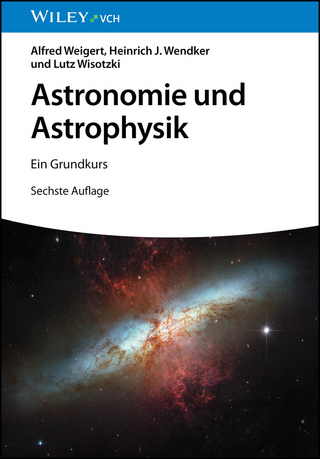Alpha Centauri
Springer International Publishing (Verlag)
978-3-319-09371-0 (ISBN)
As our closest stellar companion and composed of two Sun-like stars and a third small dwarf star, Alpha Centauri is an ideal testing ground of astrophysical models and has played a central role in the history and development of modern astronomy-from the first guesses at stellar distances to understanding how our own star, the Sun, might have evolved. It is also the host of the nearest known exoplanet, an ultra-hot, Earth-like planet recently discovered.
Just 4.4 light years away Alpha Centauri is also the most obvious target for humanity's first directed interstellar space probe. Such a mission could reveal the small-scale structure of a new planetary system and also represent the first step in what must surely be humanity's greatest future adventure-exploration of the Milky Way Galaxy itself.
For all of its closeness, Centauri continues to tantalize astronomers with many unresolved mysteries, such as how did it form, how many planets does it contain andwhere are they, and how might we view its extensive panorama directly?
In this book we move from the study of individual stars to the study of our Solar System and our nearby galactic neighborhood. On the way we will review the rapidly developing fields of exoplanet formation and detection.
Martin Beech is a Professor of Astronomy at Campion College, The University of Regina, Canada. He has an MSc from Sussex, UK, and earned his PhD at Western Ontario. He has written several books for Springer.
Discovery, Dynamics, Distance and Place.- Stellar Properties and the Making of Planets: Theories and Observations.- What the Future Holds.- Appendix I: The Magnitude Scale and Stellar Classification.- Appendix II: Stellar Motion and Closest Approach.- Appendix III: The Orbit and Location of a Cen B.
"I found this to be a thoroughly fascinating, thought-provoking, and engaging volume and can recommend it. The text is well-written and draws the reader in, and, speaking personally, the slightly larger font makes it easier on the eyes." (Robert Argyle, The Observatory, Vol. 136, April, 2016)
"In general this book was wonderful in making the reader think more deeply about stars, their distances and their similarities and differences to our Sun. Also the question whether Proxima Centauri is actually a part of the Alpha Centauri system is very interesting. The book is well written and researched and it makes you long for other similar books about some other remarkable stars as well." (Kadri Tinn, AstroMadness.com, August, 2015)
"Beech spins a remarkable tale of research on the three-star Alpha Centauri (Alpha Cen) system, includingProxima Centauri, the nearest known star to the sun. ... There is no other book quite like this. Suitable for students with some physics and mathematics preparation and researcher-writers for future films in the spirit of Interstellar. Summing Up: Recommended. Upper-division undergraduates and graduate students." (S. P. Maran, Choice, Vol. 52 (10), June, 2015)
| Erscheint lt. Verlag | 6.11.2014 |
|---|---|
| Reihe/Serie | Astronomers' Universe |
| Zusatzinfo | XXIII, 297 p. 69 illus., 38 illus. in color. |
| Verlagsort | Cham |
| Sprache | englisch |
| Maße | 155 x 235 mm |
| Gewicht | 467 g |
| Themenwelt | Sachbuch/Ratgeber ► Natur / Technik ► Weltraum / Astronomie |
| Naturwissenschaften ► Physik / Astronomie ► Angewandte Physik | |
| Naturwissenschaften ► Physik / Astronomie ► Astronomie / Astrophysik | |
| Technik ► Luft- / Raumfahrttechnik | |
| Schlagworte | Exoplanet Detection • Exoplanet Formation • Exploration of Nearby Stars • Interstellar Space Probes • Near-by Planetary Systems • planet formation • Solar Neighborhood • Solar system formation • Star Structure and Evolution • Sun-like Stars |
| ISBN-10 | 3-319-09371-1 / 3319093711 |
| ISBN-13 | 978-3-319-09371-0 / 9783319093710 |
| Zustand | Neuware |
| Informationen gemäß Produktsicherheitsverordnung (GPSR) | |
| Haben Sie eine Frage zum Produkt? |
aus dem Bereich




